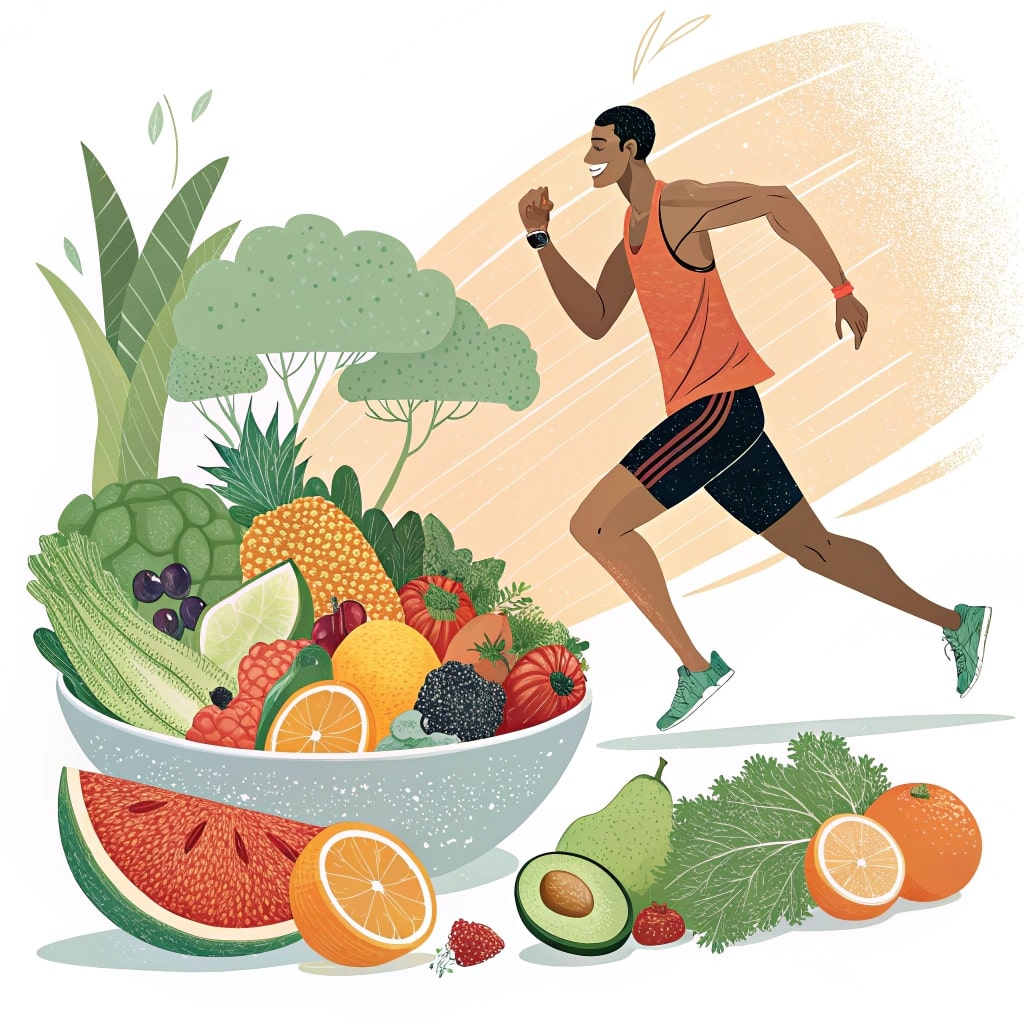Are you a competitor pushing for peak performance? Do you find your focus fading during crucial moments?
It’s easy to think of nutrition solely in terms of muscle gain and recovery – fueling the body for physical prowess. But what if there was another critical factor, one that dramatically impacts cognitive function and mental sharpness?
Too often, athletes overlook the profound connection between diet and brainpower.
Imagine consistently clear thinking, enhanced reaction times, and a stronger ability to strategize under pressure – all fueled by the right food choices. This will unlock your full potential.
Let’s dive into how an anti-inflammatory diet can be the game-changer you’ve been searching for, revealing exactly what you need to fuel a truly exceptional athlete brain.
Fueling Mental Acuity – Now
It’s easy to think peak performance comes from endless training – pushing harder, longer, until you break. But what if the biggest obstacle isn’t physical fatigue, but a brain struggling to function at its best?
That feeling of mental fog after intense workouts or competitions… it’s often more than just exhaustion. It could be inflammation silently impacting cognitive abilities.
Elite athletes aren’t solely relying on sheer willpower; they’re meticulously managing their internal environment to optimize brain function alongside their physical training.
The connection between diet and mental acuity is becoming increasingly clear – what you fuel your body with directly impacts how sharp, focused, and responsive it becomes.
Every processed meal, every sugary drink, adds another layer of inflammation, diminishing the potential for peak cognitive performance.
The truth is, many athletes aren’t realizing that a powerful brain isn’t built on brute force alone; it starts with a foundation of anti-inflammatory nourishment.
Let’s explore exactly how shifting your diet can unlock a new level of mental sharpness and performance – starting now.
Neuroinflammation’s Stealth Attack
People often think about performance when it comes to athletes. But there is a sneaky factor that can sabotage even the most dedicated training: neuroinflammation.
It’s like this – your brain, just like any other part of your body, can become inflamed. This isn’t always obvious, but chronic inflammation can really mess with how you think and perform.
Think about it: Intense training puts a huge demand on your nervous system. And that stress—the fatigue, the pain—it triggers an inflammatory response in the brain. It’s like a constant low-level battle going on inside.
This neuroinflammation can interfere with key processes needed for peak performance – things like focus, reaction time, and learning new skills. Essentially, it’s a stealth attack on your cognitive abilities.
The good news is that you have some control over this! And adopting an anti-inflammatory diet—one rich in foods that combat inflammation—can help quiet down the brain’s inflammatory response and sharpen your mind for optimal performance.
The Brain-Gut Connection Explained
Every brain is connected to a gut. And that connection isn’t just about digestion; it’s a complex pathway impacting mood, energy levels, and even cognitive function – especially when you’re pushing your physical limits like an athlete.
Think of it this way: Your gut is teeming with bacteria – trillions of them! These aren’t just random microbes; they form what’s called the gut microbiome. And this microbiome directly influences how your brain functions through a network known as the ‘brain-gut axis.’
Certain types of bacteria produce neurotransmitters—chemicals that send signals between nerve cells—like serotonin and dopamine. These neurotransmitters play a huge role in mood regulation, motivation, and focus – all vital for peak athletic performance.
Now, when you’re training intensely, your gut is under stress too. This can disrupt the balance of your microbiome, favoring less beneficial bacteria and potentially leading to inflammation throughout your body. This inflammation isn’t just a physical issue; it can actually cross the blood-brain barrier and directly impact neuronal health, impairing cognitive function like reaction time and decision-making – things crucial for an athlete’s success.
This inflammation isn’t just a physical issue; it can actually cross the blood-brain barrier and directly impact neuronal health, impairing cognitive function like reaction time and decision-making – things crucial for an athlete’s success.
So, by focusing on an anti-inflammatory diet—rich in fiber, fruits, and vegetables that nourish a healthy microbiome—you’re essentially supporting optimal brainpower alongside your physical training. It’s about fueling both body *and* mind!
Oxidative Stress & Cognitive Decline
During intense physical activity, your body produces a lot of free radicals. These are unstable molecules that can damage cells – including those in your brain. This is called oxidative stress.
Oxidative stress and cognitive decline go hand-in-hand. When there’s too much damage from these free radicals, it can impair how well your brain functions.
Think about it – when you push yourself hard during training, your neurons are working overtime. This generates more oxidative stress, potentially impacting memory and focus.
The good news is that what you eat plays a huge role in managing this process. Certain foods can help combat oxidative stress and protect your brainpower.
Essentially, an anti-inflammatory diet helps to minimize the damage caused by free radicals and supports optimal cognitive function – especially for athletes who demand peak performance from their brains.
Inflammation’s Impact on Neuron Health
It’s like this: Your brain is incredibly sensitive. It needs fuel – nutrients – to function at its best. But when there’s too much inflammation going on in your body, it can actually damage those delicate neurons that control everything from reflexes to memory.
Think about it—inflammation is a natural response to injury or infection. However, chronic inflammation, caused by things like poor diet and stress, creates constant cellular distress. This distress directly impacts neuron health.
For example, if you’re constantly consuming processed foods high in sugar and unhealthy fats, it can trigger an inflammatory response throughout your body, including the brain. And this ongoing inflammation can lead to reduced cognitive function.
The impact is that damaged neurons struggle to communicate effectively. This means slower reaction times, difficulty concentrating, and potentially even memory problems. It’s a bit like trying to send a message through static—it gets distorted and delayed.
So, by reducing inflammation – through diet and lifestyle choices – you’re essentially protecting the very foundation of your brainpower. You are safeguarding those neurons from damage, allowing them to function optimally.
Dietary Components – Key Players
Dietary components – key players refer to the specific foods and nutrients that play a crucial role in supporting brain health and athletic performance. You’ll find that certain elements have a particularly powerful effect on cognitive function and physical prowess.
Consider things like omega-3 fatty acids, antioxidants, and complex carbohydrates as vital components. These contribute to reducing inflammation within the body, which is incredibly important for optimal brain health.
For example, foods rich in omega-3s – think salmon or flaxseed – can help reduce neuroinflammation, potentially improving focus and reaction time. Similarly, antioxidants found in berries and leafy greens combat oxidative stress, protecting brain cells from damage during intense training. Complex carbohydrates provide sustained energy for athletes, fueling both physical exertion and cognitive processes.
Omega-3s & Brain Cell Resilience
Omega-3s play a vital role in bolstering brain cell resilience. These essential fats are crucial for maintaining healthy neurological function.
Think about it – your brain is constantly firing signals, demanding energy. Without sufficient omega-3s, those connections become vulnerable.
Specifically, they help shield neurons from damage caused by inflammation. This protection is especially important during intense physical exertion and recovery.
The remarkable thing about these fats is their ability to strengthen the very structure of your brain cells. They support a healthy membrane that’s more resistant to stress.
This means you’re better equipped to handle the challenges of training, competition, and mental fatigue. It’s like building a fortress around your most valuable asset – your mind!
Ultimately, incorporating omega-3 rich foods into your diet can help ensure your brain stays sharp, focused, and ready for peak performance.
The Power of Polyphenols – Antioxidants
Think about how your brain functions. It’s a remarkably complex organ that needs fuel—and protection—to perform at its best. You rely on it for everything: learning, remembering, focusing, and reacting.
That’s where polyphenols come in – these are powerful antioxidants found naturally in foods like berries, dark chocolate, green tea, and nuts. They’re like little bodyguards for your brain cells!
Polyphenols help combat oxidative stress. This means they neutralize damaging free radicals that can harm brain cells and impair cognitive function. It’s a bit like cleaning up pollution before it causes damage.
These antioxidants, specifically polyphenols, are packed with beneficial compounds – these compounds support healthy nerve connections. They promote neuroplasticity, which is the ability of your brain to adapt and form new connections.
Essentially, they’re building blocks for sharper thinking and improved performance. The more you consume these antioxidants, the better equipped your brain becomes to handle challenges and learn effectively.
So, fueling your brain with a diet rich in polyphenols isn’t just about overall health; it’s about optimizing your mental edge – enhancing your focus, memory, and reaction time.
Gut Microbiome & Mental Performance
Have you ever considered that a healthy gut could be key to peak athletic performance? It’s more than just feeling good – your brainpower might actually depend on it.
The connection between your gut and your mind is becoming increasingly clear, particularly when it comes to athletes. Your microbiome – the community of bacteria living in your digestive system – plays a surprisingly large role.
Think about this: these tiny microbes produce neurotransmitters like serotonin and dopamine, chemicals that directly influence mood, motivation, and focus. A diverse and thriving gut microbiome can essentially ‘feed’ your brain, improving cognitive function and reaction times. Conversely, an imbalance – a less-than-ideal microbiome – could lead to mental sluggishness and difficulty concentrating.
Inflammation is another crucial piece of the puzzle. Intense training puts significant stress on the body, leading to inflammation. This isn’t necessarily bad; it’s part of the recovery process. However, chronic, low-grade inflammation can negatively impact brain health, potentially hindering cognitive performance and slowing down recovery times – essentially creating a mental block that prevents you from reaching your full potential.
Anti-Inflammatory Foods – Practical Choices
Just imagine having peak performance every time. That’s what an anti-inflammatory diet can help you achieve! It’s not just about fueling your body; it’s about optimizing brain function for athletes. The way you eat directly impacts how your mind performs, focusing, reacting, and recovering – all crucial elements of athletic success.
Choosing foods that fight inflammation is a really smart move when you want to boost performance. Constant inflammation can cloud your thinking, slow reaction times, and make it harder for your body to repair itself after intense training. Let’s look at some practical choices you can make – foods that actively help reduce this internal fire.
Berries are a fantastic start: Think blueberries, strawberries, raspberries—they’re packed with antioxidants called anthocyanins. These compounds directly combat inflammation and protect brain cells from damage caused by exercise stress. Adding them to your breakfast or smoothies is an easy way to get this benefit.
Fatty fish are a powerhouse: Salmon, tuna, mackerel – these offer omega-3 fatty acids, particularly EPA and DHA. These fats have powerful anti-inflammatory properties that can improve cognitive function and reduce muscle soreness after workouts. Aim for at least two servings per week.
Leafy greens provide essential support: Spinach, kale, collard greens are brimming with vitamins, minerals, and antioxidants. They help protect brain cells from oxidative stress – a major contributor to inflammation – and enhance overall cognitive health. Try incorporating them into salads or sautéing as a side dish.
Healthy fats are key: Olive oil, avocados, nuts and seeds – these contain monounsaturated fats that also have anti-inflammatory effects. They support brain cell membrane health and improve communication between neurons, crucial for optimal athletic performance.
Optimizing Nutrient Timing for Athletes
You’ve probably heard about fueling your body for peak performance – but what if optimizing your nutrition could actually sharpen your mind too? It’s a game changer.
Think about it this way: inflammation is like a sneaky saboteur, messing with brain function and slowing down reaction times. And the good news is, what you eat can directly impact that level of inflammation in your body.
Fueling up with foods rich in antioxidants – think berries, leafy greens, and colorful vegetables – helps combat those inflammatory processes. This means clearer thinking, better focus, and quicker reflexes on the field or court.
Timing is everything when it comes to nutrient intake for athletes. Consuming a mix of carbohydrates and protein after training replenishes energy stores and supports muscle repair— which also reduces inflammation.
A good post-workout snack might be Greek yogurt with fruit or a protein shake blended with spinach. These choices provide the building blocks your body needs to recover efficiently, minimizing any negative impact on brain health.
So, strategically timing your meals and snacks around workouts – focusing on anti-inflammatory foods— can truly optimize your athlete’s brainpower and unlock peak performance.
Beyond Nutrition – Recovery Protocols
Despite a solid nutrition plan, recovery protocols can dramatically boost athletic brainpower.
Think about it— intense training creates inflammation in the body. This isn’t just muscle soreness; it impacts cognitive function too! Focusing on reducing this internal fire is key.
Things like turmeric and ginger are fantastic for their anti-inflammatory properties, which can help sharpen focus and improve reaction times. Adding these to your post-workout routine could make a real difference.
Recovery isn’t just about rest; it’s about actively reducing inflammation.
Consider incorporating things like magnesium supplements— they’re fantastic for muscle relaxation and can help calm the nervous system, contributing to better mental clarity. And make sure you are getting enough sleep – this is a major factor in recovery!
So, beyond just fueling your body, prioritizing anti-inflammatory strategies—through diet and supplements—can truly unlock peak athletic performance by optimizing brain function.
Maximizing Athletic Potential – Brain First
The connection between a healthy brain and peak athletic performance is becoming increasingly clear. It’s not just about muscles; your mind plays a crucial role in reaction time, strategy, and overall execution.
An anti-inflammatory diet can significantly impact this – fueling sharper focus and improved cognitive function for athletes.
Think of it like this: reducing inflammation allows nutrients to flow more freely to the brain, optimizing its ability to learn, adapt, and respond quickly during competition. Foods rich in antioxidants and omega-3 fatty acids are key players here.
You can enhance your athletic potential by prioritizing foods that combat inflammation – like berries, leafy greens, and fatty fish.
These choices support brain health, leading to improved concentration and quicker decision-making on the field or court. It’s about building a foundation for optimal mental performance.
Ultimately, maximizing athletic potential – Brain First – means recognizing that fueling your mind is just as important as fueling your body.
Fueling Focus: Unlock Peak Performance Through Diet
Optimal brain function isn’t just about sheer willpower; it’s fundamentally linked to how well our bodies are nourished.
The science is increasingly clear – chronic inflammation can significantly impair cognitive abilities, impacting everything from reaction times and memory recall to strategic thinking and overall mental clarity. An anti-inflammatory diet, rich in fruits, vegetables, healthy fats like omega-3s, and lean protein, actively combats this internal disruption. These foods provide the building blocks for neurotransmitters—the chemical messengers that govern mood, focus, and cognitive processes – while reducing damaging oxidative stress within the brain.
By prioritizing nutrient density and minimizing inflammatory triggers like processed foods and excessive sugar, athletes can experience a noticeable improvement in mental sharpness, reaction speed, and sustained concentration during training and competition. This translates to enhanced performance and a greater ability to adapt and strategize effectively.
Invest in your brainpower today – make conscious dietary choices that support optimal cognitive function. Embrace the power of food to elevate athletic potential and unlock peak mental performance for lasting success.




